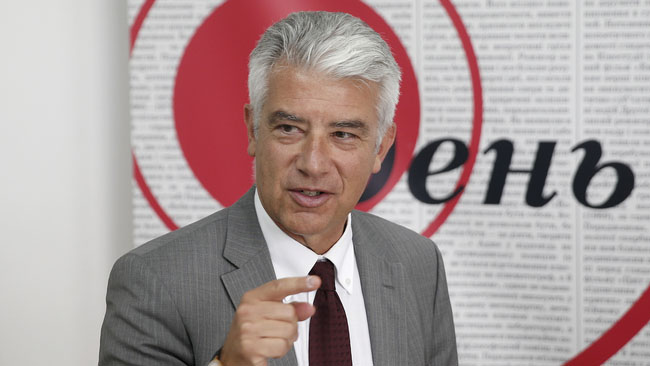In search of a neighborhood policy
German Ambassador to Ukraine Ernst REICHEL: “The Venice Commission’s conclusion is unlikely to put an end to the education law language dispute”
The roundtable “Relations with EU Neighbors: in Search of a Neighborhood Policy for Ukraine,” organized by the New Europe center, has produced rather unexpected results.
On the one hand, the report “Ukraine’s New European Neighborhood Policy: What Did the Stress-Test by the Education Law Show?” includes a thorough analysis of why some EU member states reacted so strongly to Article 7 of the education law. In particular, New Europe analyst Daria Haidai explained this by the fact that Ukraine is not adequately present in the information space. Besides, she emphasized: “We must not give post factum explanations – after making decisions. Moreover, there should be no impression that they were made without a public discussion and, what is more, our neighbors should not have a feeling of surprise and inconsistency.”
In her view, Ukraine’s “language conflict” with its neighbors exposed a fault in parliamentary cooperation, for it is not only the Foreign Ministry and the Presidential Administration that are in charge of foreign policy.
Deputy Foreign Minister Vasyl Bodnar noted that “the education law caused a public stir, and, at the same time, we are trying to communicate and eschew rhetoric.” In his words, “the national interest of a state lies in promoting the official Ukrainian language which is to become a means of communication and development for people. But this will not be done at the expense of ethnic languages. Therefore, we will continue our dialog with foreign states.” At the same time, the deputy minister noted that, tapping various resources, Russia is trying to make Ukraine quarrel with its neighbors.
German Ambassador to Ukraine, Ernst Reichel, believes that the root cause of the “language conflict” with neighbors is not so much in Ukraine’s communication with the outside world as in the fact that it was a mistake to make last-minute amendments to the education law, for which Ukraine is now paying.
At the same time, the ambassador pointed out that, in his opinion, Hungary’s reaction to this law was not adequate or well thought out. He also confessed that if he were Hungarian, he would not feel comfortable. “All children must know the Ukrainian language in order to be able to mingle, but this does not mean that they must obligatorily study mathematics or physics in Ukrainian,” Reichel emphasized. In his view, the Venice Commission’s conclusion is unlikely to put an end to the language dispute. “Every side usually chooses what it likes in this body’s all-embracing reports,” the ambassador explained. This is why he thinks Ukraine may have to alter Article 7 of the education law.
Meanwhile, Balazs Jarabik, a non-resident scholar at the Carnegie Endowment for International Peace, where he focuses on the Russia and Eurasia Program, pointed out in his speech how a similar conflict was resolved by Hungary and Slovakia in which a sizable Hungarian minority resides.
This became possible after Robert Fico and Viktor Orban had consolidated their positions on nationalist grounds in Slovakia and Hungary, respectively. Jarabik stressed that, oddly enough, these politicians managed to agree on deescalating the conflict. As a result, task forces were formed to discuss and propose decisions to settle the conflict.
Conversely, the expert noted, Ukraine lacks political consolidation, while elections are coming up in Hungary.
PACT Ukraine Director Roland Kovacs pointed out that Hungarians are almost unanimous in condemning the “language law,” as even the liberal media are saying, although in reality it is about the education law, particularly Article 7.
He explains that this happens because the Hungarian mentality suggests preservation of the native language as identification of Hungarianness. In the opinion of Kovacs, “Ukraine should demonstrate its Europeanness by behaving in the European style and learn to use European instruments, including European Union laws. In this situation, the most important instrument is the European Charter for Regional or Minority Languages. Hungary signed it and recently received an EU recommendation to develop education in the minority languages. Therefore, Hungary, Slovakia, Romania, and Ukraine can develop together and have a common platform.”
Newspaper output №:
№79, (2017)Section
Day After Day





